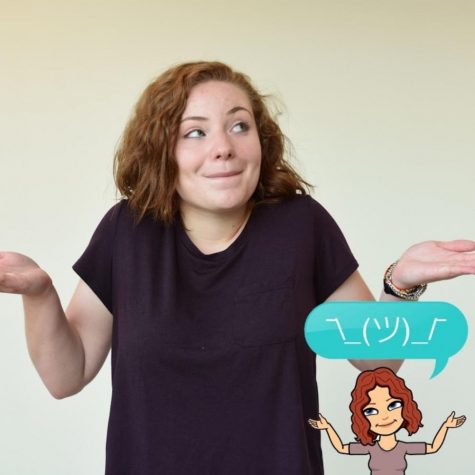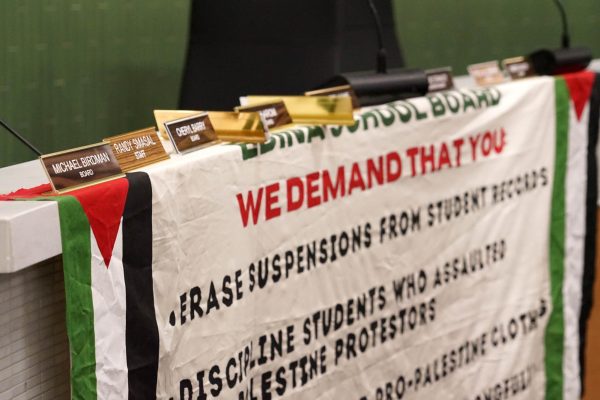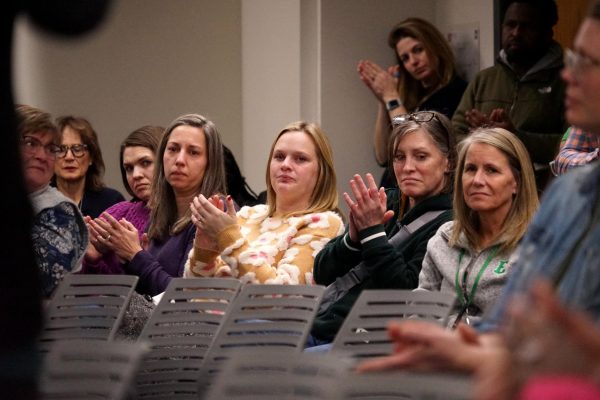Minnesota Academic Balance Bill Passes On to E-12 Finance Committee
March 20, 2018
On March 8, the Minnesota Senate Committee on E-12 Policy held a hearing on S.F. 2487, the newly proposed Academic Balance Bill. Following the hearing, the bill was passed by a 5-3 vote of the Policy Committee, and was referred to the E-12 Finance Committee.
The bill was written by Senators Carla Nelson (R) and Paul Anderson (R), and was first introduced on Feb. 20. As introduced to the Policy Committee on March 8, S.F. 2487 sought to prevent teachers from promoting “specified social or political viewpoints,” required “caution from classroom teachers when expressing personal views in the classroom,” and prohibited “the introduction of controversial matters without a relationship to the subject taught.”
Following the March 8 hearing and testimonies, S.F. 2487 was amended during a call of the Senate on March 12. Two sections were added to the bill, one which would prohibit teachers and other employees from “using public resources for advocacy,” and another which would award a one-time grant to any district or charter school that adopted an “academic balance policy” during the 2019 fiscal year.
The debate over whether or not controversial topics and personal political viewpoints should be discussed in a classroom setting has been raging in Edina Public Schools over the last two years, and the question of whether or not teachers should feel free to express their own views has been at the center of the debate. Some Edina High School teachers came under fire specifically for the expression of their personal political opinions in the days following the 2016 presidential election.
Many Edina High School students, teachers, and community members attended the March 8 hearing to testify for or against the bill. In total, 15 testimonies were given, four in favor of the bill, and 11 against.
Several supporters of S.F. 2487 hope the bill would prevent teachers from alienating students with differing opinions.
“I am one of several conservative students that have been singled out by teachers for my conservative beliefs,” EHS junior Tatum Buyse said. “[The bill] will benefit Minnesota public schools because it will help students learn how to think, rather than simply being told what to think.”
Opponents of the bill argue that the bill would do more to limit student expression by discouraging teachers from introducing and leading discussions that encourage open debate on important, complicated issues.
“If I was a teacher I would be very scared of what I can say and what I can’t say,” EHS senior Destiny Washington said. “The most serious conversations that I’ve had in the classroom were about controversial history. And not with teachers saying ‘you have to believe this,’ but with them telling you the facts, and telling you historical things and things of that nature. And if you try to stop that, and try to halt that, it can be really detrimental to our education as a whole.”
S.F. 2487 is set to be heard next by the E-12 Finance Committee. The date of the next hearing is unknown.











Todd Wadsworth • Mar 27, 2018 at 11:36 am
Everything in my being says to stop, don’t send this, stay quiet.
I teach in MinnState, mostly math, sometimes philosophy, doctorate is in education. When I teach
ethics or critical thinking, I challenge every argument. I also support every argument. I try to improve every students’ ability to reason deeply and arrive at their own beliefs. I tell my students they will know nothing about my personal politics or beliefs at the end of the term, even though I am provocative in class. My job is to help students learn how to think, not what to think. I have always thought this was a liberal point of view. I am not so sure anymore.
Do I believe too many teachers (at all levels) intimidate some students from speaking their minds? Yes, I do. Do I believe this is wrong? Yes, I do. Frankly, I avoid speaking up myself, too often. It’s just not worth it. The bullying that starts before a sentence is finished is just not worth it. It saddens me. I used to expect the bullying only from the right. Now it is clearly more from the left.
I am a New England liberal. But, I believe I grow by listening (closely) to everyone’s point of view. Keep your friends close and your enemies closer, right? Suppressing conflicting points of view is not only against our best traditions, it’s not smart. I cannot change someone’s opinions unless I understand where they are coming from. This is a lesson I try to convey to my students.
Good for the conservative students at Edina who stood up for themselves. As for SF2487… clearly a lot of people believe that classrooms are unreasonably biased or the bill would not get this far. If a lot of people feel this way, it’s incumbent on me to figure out why. Listening, really listening, is a good place to start.
Ginni Arons • Mar 25, 2018 at 10:33 pm
This bill is a terrible proposal. It will limit honest discussions in civics and political science. Limiting free speech is never good and that is what this bill seeks to do. Why are people so afraid of ideas that differ from their own? Why is critical thinking so scary?